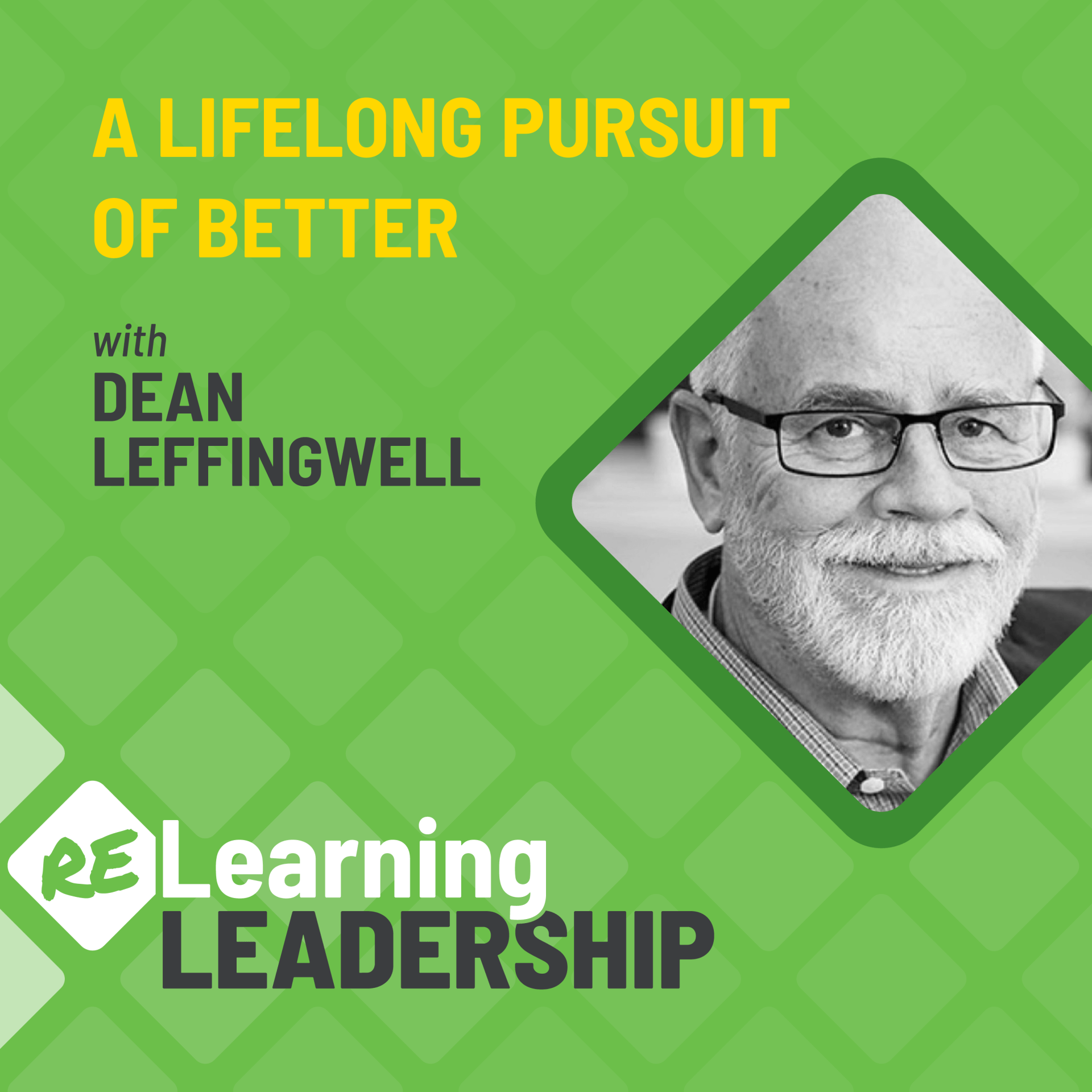54: Feedback Fundamentals with Frank Fitzlaff
Do our leaders give enough of the right kind of feedback?
In this episode of the Relearning Leadership podcast, host Pete Behrens is joined by special guest Frank Fitzlaff, a Zurich-based Agile Coach and Agile Leadership Journey Guide.
Pete and Frank discuss how to foster a culture of continuous improvement through feedback. Discover why feedback is not just a skill but a muscle that requires regular exercise, the crucial role of psychological safety in effective feedback, and the transformative power of positive reinforcement in the workplace.
Whether you're an experienced leader or just starting your leadership journey, this episode offers valuable insights and practical tips for making feedback a powerful tool for growth and collaboration.
Tune in to learn how effective feedback – both positive and constructive – can transform the way you lead and communicate!
Frank Fitzlaff, Agile Coach
With more than 30 years of experience in IT and telecommunications leadership, Frank’s strengths are agile transformations, business agility, product management, and international business development. Frank is an Agile Coach for flowdays and at Swisscom.
In addition, he serves as an Advisory Board Member for the startup, Gravity. In 2014, Frank discovered the concept of agile leadership and has since consistently implemented the agile principle of servant leader and coach with his teams and customers.
As a former top volleyball player, Frank has a high degree of resilience and flexibility – and knows that a well-rehearsed team is always better than the sum of the individual players.
Connect with Frank

Relearning from this episode…
Feedback is a Continuous Learning Process
Feedback is a muscle that needs constant training to maintain its strength. Learning how to give and accept feedback is a continuous learning process. This ongoing practice is crucial because feedback skills can deteriorate without regular use.
Psychological Safety in Feedback
The dynamics of giving and receiving feedback can vary greatly depending on the level of trust and comfort among team members. In environments where psychological safety is high, feedback can be more direct and effective. Conversely, in less safe environments, feedback needs to be approached more carefully, respecting a number of sensitivities and situational context.
The Power of Positive Feedback
Expressions of gratitude, recognition of good work, and sharing compliments are vital for team morale and individual motivation. This positive reinforcement is often just as impactful as monetary rewards and is essential for building a supportive and collaborative work culture.
Explore:
Related Episodes
5: Rebuild Your Leadership Habits
How does intention subvert accidental leadership? Crystal Mills, a Regional Vice President for a Canadian credit union, shares her rollercoaster story exploring the highs and lows in rebuilding her new leadership habits amid overwhelming stress and anxiety.
Both Crystal’s story, and our discussion following, is with Jasmine Kernaleguen, a leadership disruptor who inspired Crystal’s new leadership path and engaged Crystal on her journey.
7: A Lifelong Pursuit of Better
Why should a leader prioritize learning? Dean Leffingwell, a business innovator and founder of the Scaled Agile Framework (SAFe), has dedicated his work life in pursuit of a better way forward, both as a leader himself and in building companies helping others to be better.
Pete goes behind the curtain with Dean, not to explore his latest creation, but rather to explore the leader behind it. As a leadership mentor and advisor to Pete over the years, Dean shares his own leadership journey so we may learn from his experience.
Recent Episodes

Episode Transcript
Pete Behrens:
Do we really need more feedback training? Welcome to another episode of (Re)Learning Leadership, where we explore a specific leadership challenge and break it down to help improve your leadership, your organization, and, just possibly, your personal life. I'm Pete Behrens, and today I'm joined by Frank Fitzlaff, an Agile Leadership Journey Guide, based in Zurich, Switzerland. He works as an internal coach with Swisscom and an external coach with Flowdays. Now, we know feedback is a core principle of agility. Without it, we really don't know where and how to pivot. Yet, this landscape is a pretty interesting one. And what I'm hopeful you'll learn from our discussion is why we actually need more practice. So, I expect you'll enjoy my talk—my discussion—with Frank.
Welcome to the show, Frank!
Frank Fitzlaff:
Thank you, Pete!
Pete Behrens:
Well, it's great to have you. And I just want to lay it on the table: do we really need more feedback training?
Frank Fitzlaff:
Yeah. Thank you, Pete, for that question. This is really an awesome one. Whenever I engage with people as an Agile coach within the companies, then I normally get the answer: “No, no, we are fully fine! Feedback, everything, okay? We don't need that!” [Laughs] And then as soon as I start digging a little bit and ask a few more questions, I get, then, the impression, and I know, “Yes, we all have to train!” And after many years in that field, I see feedback as a muscle. So, it's something which we have to train all the time. We need to constantly think about it and have it alive and experience it. Otherwise it gets smaller and doesn't have that strength anymore. So, I guess everybody has, from time to time, the need—or would benefit from getting and enjoying some feedback training.
Pete Behrens:
Yeah, yeah. I love that metaphor, right? The strength training. You know, we often think about—something that's acquired is done, right? I acquired knowledge; I'm done. Or I'm, you know—I've acquired a particular skill, and I'm done. “I can ride a bicycle!” And you're saying feedback is different than that, right? Feedback is different than that bicycle training, where, “Okay, I know how to do that!” It's actually something that deteriorates, or that falls away if we're not exercising it. That's an interesting way to look at it.
Frank Fitzlaff:
Yeah, yeah, I think, sometimes, the—giving and receiving feedback is not so natural. If we do it, maybe, in an environment where we are at home, so we're very close to family, that's easier. We’re very candid; we’re straightforward. Boom! Out of it. But as soon as we are in a professional environment, it's not an easy thing. Sometimes it's harder; sometimes it's easier. But it's not something which is really, really natural. As an example: when I engage with teams and then I ask them, “Hey, what about feedback?” They say, “Yeah, that's what we do! Well, we are working agile, you know? We, of course, are professionals in giving and receiving feedback.” And then I just ask, “What was the last behavior within your team you improved because of feedback, which you got in a retrospective?” And then, sometimes, it gets very quiet. [Laughs] And just—like, we tend to lie to ourselves regarding feedback. So—but then, when we start engaging with people and we get, also, some, like, impulses and we learn how to deal with feedback, then it's also fun. And it's a great growth opportunity. Feedback is a perfect growth opportunity.
Pete Behrens:
I mean, in one sense, you can think about feedback—is, like, continuous. I can even see our dialogue has feedback, right? We are responding to each other. You've got some verbal—or some non-verbal—you know, cues that are going on, in terms of that feedback. How you respond to questions and answers is feedback. So, I imagine, to some degree, a team's thinking—like, we live in feedback. Like, we're talking about things all the time. So, take us that one step further. Like, what's the difference between this and, maybe, a team even, you know, entering in that space of, “Hey, that—you screwed up that field!” Or, you know, “We built that presentation a little bit incorrectly.” I mean, that's feedback! Take us a little deeper than that. Like, what's the next step down that really, kind of, maybe, we're missing.
Frank Fitzlaff:
If you have, within a team, a situation where you have a very high psychological safety, then it's easy to also go down to the next step and to be kind to each other and to—I already—I saw in teams that they were extremely blunt to each other and just said stuff directly, which is completely not according to feedback rules, but it works perfectly! [Laughs] In other teams, it's not the case. So how do you deal with that? And so—then that's the moment where you need to have, like, training kicking in. Otherwise feedback—when we say we give once-a-year or twice-a-year feedback to each other, and it's kind of an artificial round, then it's just like hogging animals in a zoo. So, we're just, like, very nice. We are very comfortable, and everybody is just, like, affirmed. “Yes, you do it well!” And that's it. But that's not the real power of feedback. If we really care about people, we have to be, like, honest, critical, candid. That's what we need, then, as a team. And this is the next step. The next step, sometimes, needs training. So there are good opportunities you can do to get to that level, but it's something which is not coming by itself.
Pete Behrens:
Yeah. I mean, you mentioned the—maybe the biggest one that, maybe, we see is the lack of self-awareness. The lack of—you know, we've got the cognitive or confirmation bias. We see what we want to see; we hear what we want to hear. Is that the biggest challenge when it comes to, maybe, the hurdles for feedback? Or, maybe, touch on, maybe, what you see as maybe some of the large challenges when it comes to giving and receiving feedback.
Frank Fitzlaff:
So, that's definitely one part. So that—you need to have a certain self-awareness, that you even realize how important feedback is, so you can hear the theory about feedback and how it will improve the behavior in the team. And it strengthens psychological safety, and so on. That's one thing to hear it. And then the next one—but what does it mean for me? So, how do I get there? And the biggest hurdle there is, then, that you not only hear it—theoretical—but that you really try to experience it. And how do you try it? Within Swisscom, as an example, we have a concept of a Feedback Dojo. So that's—we really go to the teams, and we have, like, some exercises where we train giving—but not only giving!—but also receiving feedback, how to do it with the words, with the behaviors. So that I say, “First, I observe something.” Then this I interpret. And then, the next thing is—”That's what makes me feel like blah!” And in the end, “I would”, I liked”, and “Something I wished”. So then, just, first to, like, give people the confirmation that they can address a sensitive topic in a way that it will not offend or hurt the other person at all. And that you need to train.
So, then we bring up artificial business situations and let them experience it. One is the Observer. Two are giving, receiving feedback and then share how it was. Was it also honest? Because, I mean, I might go through all these steps like an engineer. And I say, “It's A, B, C, D.” And that does not work at all! So, it has to be with the right tone, with the intention. It has to be honest. The body language needs to be appropriate, and so on. So, then we try this out, and then, afterwards, the teams realize it's kind of quite difficult to do that. [Laughs] What's in the next step? And then we find some small exercises where they can do—as an example, after each weekly or bi-weekly session, they have—they have someone giving feedback. If, like, the session was according to their values, rules, and so on. So, this is a small step, and then it starts growing and can do other exercises. It's really something you need to train. For some people, it’s easier, and for others, it's important to do, but it needs training.
Pete Behrens:
Sounds like a feedback spin class at your local gym! [Laughs]
Frank Fitzlaff:
Exactly. Yeah, yeah. Kind of spin class. And you need to repeat it regularly! Exactly.
Pete Behrens:
Exactly. What was interesting—and when you were talking about that—it's almost more about me and how am I set up? How am I—what is my mindset? What is my body language? What is my tone? What is my presence? There's almost, you know—I often think, you know, “I'm giving feedback. It's about the other person.” But you're almost putting a mirror on here and saying, “No, it's really about you and how you're presenting.” Can you maybe touch on that a little deeper? Because that's interesting!
Frank Fitzlaff:
Okay. I think that's very important, a bit depending on the situation. So, if you are in a very comfortable situation where you know the people, each other, as an example, it's kind of a one-to-one, which regularly happens every week. And you have a high, good understanding of each other, and so on. Then it's not so important if something is not really right. And so you can just tell it and explain it. But if you would like to give feedback to someone you're not, like, working every day with, and it's maybe a sensitive topic there, you need to really, like, prepare yourself so that—maybe to even write it down, what you would like to say. And then you just go through it, and how will I do it? Maybe using it in a catalyst conversation way, where you, like, first say, “Okay, let's align what we will talk about to be sure that the other person really is in the mood to receive feedback.” And then you give it, but then you need to give it right away, directly, boom! Not like talking around it. Because it's very difficult. The other person is waiting for it. And then try to get out there by having a common agreement. And that's something which you really need, then, to prepare. So, I think it really depends on the situation where you want to give feedback. And sometimes it's not so important that like body language and everything really fits in. And sometimes it’s extremely important, and you just need to be aware of the situation. And, yeah, to be able to play with it. I think that's important, to make people realize, yeah.
Pete Behrens:
I remember Brené Brown saying, “Clear is kind.” Right? So, how can you be direct, honest, authentic, without being a jerk, right? Without being rude or opinionated. And it sounds like what you're saying is: you train them to kind of present this from a purely, “Hey, I'm seeing, and I'm feeling, and I would appreciate—”. Right? It's all these words that are respectful and authentic in the way you're presenting it. Is that a fair way to say it?
Frank Fitzlaff:
Yes, absolutely. And if we do, as an example, team feedback sessions. It's something which, also, I do on a regular basis. That means, like, a team coming together and then thinking about—what should we improve as a team that each person—her, himself—then has, like, a better, a more effective, way to, like, perform, and so on. So, just, out of me, what does it mean for the team? And then we have, exactly, situations. We can present those things on the whiteboard, and people—and there I really listen. And whenever somebody is not using the right words, like, “I observe” or “I saw” or “It's something which is, like‚—”. The most—the biggest failure people do is, “Then somebody told me that.” So it's not direct from that person directly. Then I immediately stop, because I know it goes completely wrong. I say, “No, no, please just focus on—what did you observe? You! And please tell it in a way that—”. Even start the sentence with something as simple as—every sentence you start with, “I observe”. Just—then it goes in a direction that nobody is really then heard in that session. And in other situations—it's natural, teams, for them, it's really no problem, and it flows. It goes well; no interaction is needed. It really depends on the situation. But it can be massive destruction if you have somebody giving, with good intention, a feedback in a way somebody cannot handle. It's really bad.
Pete Behrens:
You know, I know—so, you're talking about the downside of opinions, the downside of hearsay, the downside of, you know, presenting biased information, or, you know, perspectives that, maybe, are, you know, loosely coupled. I'm wondering about the other side of this, though. One of the things that we see is not enough appreciation, not enough positive feedback, not enough “thank you’s”, not enough “Great job!”, “kudos!” I'm wondering about that, because what we hear is, you know—the negative feedback hits the brain much harder than the positives, right? So you need more positive feedback, yet we don't really have a structure for it. We don't really have a very good place to put it. I'm curious on your thoughts on the positive side of feedback.
Frank Fitzlaff:
Yeah. I think this is extremely important in a team. Not only in a team, also across teams. That whenever you have an occasion—that you can thank somebody because they did a good thing. Not just, like, for nothing. Then people realize it, that it's just like a thank you because of a thank you, but it's really, if it's honest—and a thank you or just, like, saying, “Hey, that was great, what you did!” Or “I learned a lot.” Or “That's a thought I didn't have before. Thanks a lot for sharing it!” Very simple things are so powerful. It's so powerful! It’s more powerful than money and just, like, salary increase or whatever. This is really the essence, where, like—why I think many people go to work. Because you want to have, like, an appreciation of what you do, and somebody just, like, realizes you're there and you're doing a good job and tells it to you. So, this is so important.
How to, like, trigger that? I try to go by good example and just doing it myself. And just trying, then, to influence others to also do it and—or just, like, asking, “Hey, that was something which we really benefit as a team. What do you think?” And then just, like, push a bit, that people get out of themselves. Because if you get a compliment which is honest, you like it! You love it. And it's easy to share a compliment to somebody else, and they also like it. It's a positive circle. So, you influence each other, and you like to work with that person! It's very, very simple. And that's so important, especially in large companies, where you might work with somebody, and then two weeks later, you work with somebody else. So, just, like, to get in a, really, collaboration. It's so simple: just say thank you if that was something which had been done well.
Pete Behrens:
Yeah. One of the tips or tricks I use sometimes is—if I get a kudos or a thank you or well done—you know, maybe it's a keynote speech or, you know, it's something. I'll often use a technique of asking a question. Like, “So, what—thank you!—and what did you like about it?” Or “Thank you! And, you know, what was it that caused you to say that?” So it's—it still can be a learning moment, which I think is really cool, right? Even positive feedback loops. I think if you're prepared to just ask a question—can be a really interesting way to dive into that a little bit more there.
Frank Fitzlaff:
There’s even another aspect to it. Something which—I don't know how it is in the U.S. culture. But, like, in Switzerland, we tend to, like, talk positive feedback down. [Laughs] So, somebody makes a compliment, and then we tend to say, “Oh, okay. It was—we really like it, but it was not so important. It's okay.” And I really—some years ago, I said, “Okay. I will stop doing that. I, just—whenever I get a compliment, I just say ‘Thank you very much’”!
Pete Behrens:
Good!
Frank Fitzlaff:
That's it. Just to say “Thank you for a compliment.” And doing that, also, in a team context—then you realize the other person, which gave a compliment, feels much more appreciated than when I say, “Oh, that was nothing. It's self-understanding. I do that all the time.” Just to talk it small. No, no, no! Just, like, say “Thank you very much! That's something I really enjoyed. You recognize that. Thank you.”
Pete Behrens:
Yeah, yeah, yeah. That's—yeah—the humbleness character, right? Of just, “Oh, it was nothing.” Yeah. What—so you're talking about how to, kind of, get better, right? Go to class on giving, receiving feedback a little bit. But what about when you can't prepare? Like, that surprise, that—you know, something happens, and something gets triggered. It could be a comment, could be something that a customer says, could be a meeting goes wrong, right? Something surprises you. Is there a way we can be prepared, or is there a way we can be better at those kind of feedback loops, when we don't have a chance to, kind of, practice and get ready for it?
Frank Fitzlaff:
Maybe something there is that you try, then, you try—and that's also something which is hard to do, because you need to control yourself. You try to not, like, react immediately, right? So if something just, like, triggers me, it's kind of the trigger, the flight, freeze, fight mode that is triggered, somehow, in myself. Then just saying, “No! Just, like, wait, wait, wait, wait, wait.” And then maybe, just, like let it go. And after the meeting, go to that person and check. Did I really understand it right? Was it something which really was—that was meant as—it should trigger me or not? To connect with that person instead of reacting immediately. And then it's like boom, boom, boom. Go back and forth. And then you're maybe in a meeting with ten people, and eight people feel very uncomfortable because there’s a kind of strange situation evolving, and it's escalating. And at the end, it's no need—it's no benefit for anybody. So, if there is a chance to just, like, stay calm, to just like, “Yes, okay. Yeah, let's talk about it later,” or something. Just, like, to park it for a moment and then to go into a one-on-one with that person. And I have good experience with that. Yeah.
Pete Behrens:
Yeah. I think that's—I think David Rock says you got about—he does some neuroleadership things and says you have a few milliseconds to kind of hijack that emotional adrenaline that gets kicked off when something surprises us and triggers us back. But, yeah, the concept of breath, the concept of space, the concept of time is so critical. And just being able to just take a moment, you know.
Frank Fitzlaff:
It’s very hard to find the right line. Because sometimes it's really important that you react immediately and stop it. Otherwise it gets worse, right? But sometimes you have to. And sometimes you should not. So when is—which situation is difficult to find the right balance? Yeah.
Pete Behrens:
Yeah, yeah. Yeah, it's interesting. I've got a book on my shelf here by Edgar Schein. He talks about giving and receiving help, and I love the way he twists that, right? It's not feedback. It's—he calls the book Helping. And I love that notion, that idea of thinking about this as wanting to help or others wanting to help. Versus—I don't know—feedback often has that negative, kind of, bad vibe. In music—kind of, notion of—it's, oh, you know, it just shuts your ears down because it hurts! Versus, maybe, our language isn't quite right. Is it like—I mean, this is English feedback. Does the same apply in Switzerland and Germany, in terms of the language?
Frank Fitzlaff:
It’s even worse, because the term feedback is English, right? So, when I say in German or in Swiss German, “Can I give you feedback?” That, for the other person, is clear. “Oh, wow, the shit is coming!” [Laughs]
Pete Behrens:
I love it!
Frank Fitzlaff:
Yeah, and that's—it's a very difficult situation. And if I would say I'd like to offer help, they’re like, “Oh, well, that sounds interesting!” Because this you can even do in German—right?—or in Swiss German. But talking about feedback that's—it always has this notion of—there's an out-of-band situation, and “We need to talk serious stuff now.” And, “Oh, now I'm really prepared to just, like, just shut down everything and just be in, like, a survival mode.”
Pete Behrens:
Yeah. It's time to hijack the language. And maybe we start changing. And, you know, it's interesting how much that plays into culture, you know? We think about words, like you know, failure. You know, words that end up having, you know, feedback. Like, these are judgment words; these are right and wrong words; these are good and bad words. And, you know, words around learning words, around, you know, helping. Words around, you know, understanding. You know, just using different language around your team can likely change the culture and change the reception of the way we talk to each other.
Frank Fitzlaff:
Yeah, absolutely. And it's just, like, one part of the whole team process so that people act predictively, that they act kind, that they, like, honor the human being. Stuff like this, which makes the whole package, then, around it. And the feedback part is an important piece to that. Because if you only once have a situation where, within your team, or—let's say your boss gives you complete nonsense feedback, not because of the content, but in a way that it, like, hurts you. Then the trust is gone for a very, very long time. So just, like, how to rebuild the trust, if, whenever you get in contact with that person, which is your manager, maybe, and you're afraid of, “Oh, what's happening now?” It could be such a situation as we had before. I was completely surprised, not prepared, and then boom! There was this message coming. Is this, again, such a situation or not? So, just to act consistently, to prepare people to be kind. I think it's very important to have a good, also, leadership relationship to each other.
Pete Behrens:
Yeah, yeah. So, maybe in closing—is there one thing you might recommend our watchers, listeners, to try, to be better, to maybe retrain themselves, or at least build a muscle on feedback?
Frank Fitzlaff:
Yeah. The—I think that's the one which you mentioned already. Just, like, give positive feedback. Start with that, and see how well it feels. It feels so good if you give it—I mean for the person which gives the feedback. It feels so good. If it's honest, it's the perfect thing to start with, and then you start, like, growing up this trust amongst each other, and then you can also go to, like, more critical pieces. It's like, in teams, we do something like the the compliment shower. So we just say, “Okay, now let's shower some with all the compliments we have!”
Pete Behrens:
I love that: compliment shower.
Frank Fitzlaff:
It's such a simple thing to do, but you cannot get out of it! I mean, if I shower you with compliments, you feel good! Even that—you know, it's something which was, “Oh, now everybody says a good thing, and there's so much other stuff as well.” But you will feel good and just, yeah, make each other feel good—that's a great thing to do.
Pete Behrens:
One of my favorites is an appreciative retrospective. And so—basically, we just walk around one-on-one and mix with people and say one thing you're appreciative about that other person. And just the power of positive feedback loops and the context of what you're thankful for, what you saw, how you saw them, how they showed up, is incredibly powerful. And so, I love your language—the shower of gifts that comes from it. So, thank you for sharing that. Well, Frank, I just want to say thank you for sharing your insights. And thank you for being one of the Guides in our community and for continuing to spread this wealth of knowledge and understanding.
Frank Fitzlaff:
Thank you! Thank you very much for the compliment, Pete! [Laughs]
Pete Behrens:
(Re)Learning Leadership is the official podcast of the Agile Leadership Journey. Together, we build better leaders. It’s hosted by me, Pete Behrens, with contributions from our global Guide community. It’s produced by Ryan Dugan. With music by Joy Zimmerman. If you enjoyed this episode, please subscribe, leave us a review, or share a comment. And visit our website, agileleadershipjourney.com/podcast, for guest profiles, episode references, transcripts, and to explore more about your own leadership journey.










